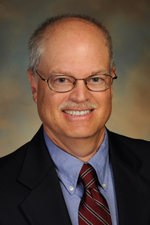|
|
 |
 |

Faculty Lecture Series
When |
Wednesday, March 9, 2011
5 PM - 6 PM |
Where |
Valerie Timken Amphitheater
Green Hospital |
Who |

|
Glen Nemerow , Ph.D.
Professor
Immunology and Microbial Sciences
|
Topic |
"Insights into adenovirus gene transfer from structural studies" |
| |
Rational development of adenovirus vectors for therapeutic gene transfer is hampered by the lack of accurate structural, biochemical, and molecular cell information. We previously identified and characterized the receptors used by adenovirus for attachment and entry into host cells as well as the viral capsid proteins used for receptor engagement. In this seminar I will discuss the process of endosome penetration by adenovirus as well as the recently determined X-ray structure at 3.5 Å resolution of the 150 megadalton adenovirus capsid. The virus structure, that contains nearly 1 million amino acids, revealed the previously missing interactions between the major capsid protein (hexon) and several accessory molecules that stabilize the capsid. The structure also reveals an altered association between the penton base and trimeric fiber protein, perhaps reflecting an early event in cell entry. The high-resolution structure provides a significant advance towards understanding the assembly and cell entry mechanisms of a large dsDNA virus and provides new opportunities for improving adenovirus-mediated gene transfer.
|
Publications |
|
Wiethoff, C. M. et al. Adenovirus protein VI mediates membrane disruption following capsid disassembly. J. Virology 79: 1992, 2005. 100:4, 2053-2058. |
| |
Moyer, C. et al. Functional Genetic and Biophysical Analyses of membrane disruption by human adenovirus. In press: J. Virology. |
| |
Reddy, V.S. et al. Crystal structure of human adenovirus at 3.5Å resolution. Science 329: 1071, 2010. |
| |
|
| |
|
|
 |
|
 |
 |
Previous Speakers
Marisa Roberto, Ph.D.
James R. Williamson, Ph.D.
Phil Dawson, Ph.D.
John Tainer, Ph.D.
Jeffery Kelly, Ph.D.
Paul Schimmel, Ph.D.
Ann Feeney, Ph.D.
Benjamin F. Cravatt, Ph.D.
Ron Milligan, Ph.D.
Erica Ollmann Saphire, Ph.D.
|
|



